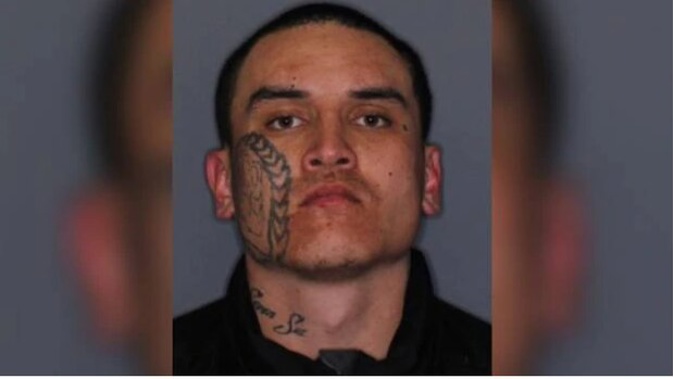
A "dangerous" criminal who made a dramatic escape from a courtroom before leading police on a chase through Auckland, shooting at officers along the way, has been jailed for a decade without parole.
The courtroom was locked down and armed police were present as Reilly Bowler was sent to prison for more than 15 years for a raft of terrifying offending including firing a pump-action shotgun at officers multiple times at close range - only narrowly missing them.
In October last year, the Herald revealed that Bowler, then 22, was on the run from police after a brazen escape from the Waitakere District Court.
He was appearing in court on aggravated robbery and car theft charges when he leapt over the dock, dodged a number of security staff and bolted outside to a waiting car.
READ MORE: Accused robber Reilly Bowler jumps out of Auckland court dock, flees in getaway car
Days later Bowler was arrested after a spectacular police chase across Auckland.
During the chase - which started on the Southern Motorway and crossed over to the North Shore and up to Rodney - police were shot at.
At least 10 police cars were pursuing the vehicle Bowler was in.
Armed police were also involved and road spikes were used.
Today the court was closed to the public for much of Bowler's appearance.
The only people allowed in the room aside from the judge, lawyers, court staff and media were the officers in charge of the criminal investigations, a victim of the offending and her support person, and Bowler's mother, stepfather and his partner.
Bowler earlier pleaded guilty to a raft of charges including aggravated robbery, wounding with intent to injure, car theft, shooting at police, driving while disqualified, reckless driving and escaping custody.
He was led into court by police, who flanked him in the dock.
Crown Prosecutor David Johnstone said the offending was serious and had an "ongoing and significant" impact on the victims - particularly given his use of firearms.
Defence lawyer Jenny Verry said Bowler had read and considered the victim impact statements and the "range of consequences" for the people he has harmed.
The crimes of Reilly Bowler
Judge Jelas outlined Bowler's litany of offending across a 12-month period from October 2017.
Many of the offences were committed while Bowler was on bail.
The first group of offences occurred between October 2017 and July 2018 and included breaching release conditions and other court orders, and driving offences.
Judge June Jelas said the most serious offence in that period was in June 2018 when Bowler assaulted and seriously injured a man in a West Auckland street.
Bowler was a passenger in a vehicle and the driver stopped and spoke to the victim which led to a "verbal altercation".
The victim walked away and Bowler followed him and punched him so hard he suffered fractures to his eye socket, skull and cheekbone.
Bowler was charged and remanded in custody.
He was eventually released on bail - and went on to commit several armed robberies.
The first was at the Hawaiian Sizzler bar in Henderson in early October 2018.
Bowler and an associate stormed into the bar, disguised and armed.
One weapon used was a hammer with a blade attached.
They demanded the patrons and staff lie on the floor and "hand over their money".
The pair got away with more than $8500 from the cash register, gaming float and patrons.
Four days later Bowler and the associate committed the second aggravated robbery.
On October 7 the pair went to the Taphouse Bar in Avondale in a stolen car.
Again, the pair were disguised and armed - one with a pistol and the other with a hammer.
The pistol was pointed directly at a victim who was ordered to "give the money".
A safe was emptied and the pair got away with $25,000 cash.
Bowler was arrested on October 10 and appeared in court, where he was remanded in custody.
It was at his next appearance on October 17 that he escaped from the dock.
The court heard that the man who allegedly carried out the robberies with Bowler had been in contact with people within the courtroom.
He was waiting outside in a car and "facilitated" Bowler's escape.
Multiple police could have been killed by Bowler
On October 19 police located Bowler and the alleged co-offender in a car.
They tried to stop the pair but Bowler leaned out the window of the car and fired a pump-action shotgun at police.
The officers estimated the shots were fired from a distance of only 10-20m.
"It was pure luck they were not shot," said Judge Jelas.
Both Bowler and the other alleged offender were said to have fired at police multiple times, hitting patrol cars.
"What follows is a multiple number of encounters between you and law enforcement officers who were endeavouring to get you and your associate to stop," said Judge Jelas.
The vehicle eventually stopped and Bowler's alleged co-offender took off.
Bowler jumped into the driver's seat and sped off - travelling at up to 160km/h and driving on the wrong side of the road.
As police finally stopped Bowler, he threw the shotgun out of the car onto the highway.
Judge Jelas said the chase and ordeal had a significant impact on police involved.
One officer involved had to take stress leave and was later diagnosed with Post Traumatic Stress Disorder.
Judge Jelas said one officer had a clear recollection of the terrifying incident.
"Your actions were purely designed to avoid apprehension … blatant disregard for the wellbeing of police," she said.
"(The first officer) recalls you pointing the shotgun directly at him.
"He believed he was going to be shot.
"He recalls hearing the shotgun pellets hitting the bonnet and windscreen of the police cars … a sense of relief at not having been shot but he also equally felt a sense of responsibility to apprehend you."
Judge Jelas said other officers had described the "consequences of starting down the barrel of a shotgun".
The impact was significant.
One officer was "haunted on a daily basis" by Bowler's actions and "found it difficult to stop thinking about it and what would have happened if (he) hadn't missed."
Another struggled to get past thoughts of "what if".
"What if he had got shot? What if one of his colleagues got shot? What if a member of the
public got shot?" explained Judge Jelas.
Another officer "replayed it over and over in his mind".
Victim impact statements revealed those caught up in the earlier aggravated robberies were "greatly affected".
Judge Jelas said the victims feared Bowler, particularly when they learnt he had escaped custody.
Bowler's criminal motivation - and how a criminal was raised
Bowler told a psychologist about this motivation for the robberies.
He said they had "nothing to do with" his affiliation to Black Power.
He was "simply seeking money for living expenses".
A pre-sentence report prepared for the court stated Bowler was at high risk of reoffending and causing further harm to others.
The court heard that Bowler's mother died when he was a baby and he was taken in by her sister and partner, a Black Power gang member.
Bowler considers the couple his parents.
He grew up in a gang environment, aspiring to become a patched member despite seeing his mother beaten repeatedly.
As a teen Bowler joined the Crips youth gang and committed his first robbery at 11.
He was a "delinquent" at school, regularly truant and expelled from intermediate.
Judge Jelas said his parents did nothing constructive to stop him and "effectively allowed" him to "socialise as a gang member".
At 13 Bowler's biological father intervened and took him to live in Australia.
There, he was a good student and obtained a sports scholarship, winning a junior Australasian boxing championship.
He stayed in Australia for three years which were mainly positive - but his father was ex Mongrel Mob who "did not refrain from meting out physical punishment".
Bowler started drinking in Australia - up to six cans of bourbon or whisky a day.
He was expelled from school when he turned up intoxicated.
When Bowler was 16 he returned to New Zealand.
He then "became entrenched in a life of crime".
"Your focus was to become a patched member of Black Power ... following the orders of Black Power members,' said Judge Jelas.
The booze and crime escalated and Bowler started using meth.
At 18 he was jailed for an aggravated robbery and while in prison he finally got his patch.
Since then he has had "very little time in the community" due to his recidivist criminal actions.
Off to jail, Bowler's sentence revealed
Judge Jelas sentenced Bowler, who has two young children, to a lengthy stint in jail.
"Firing at police requires a stern reaction from the court," she said.
She said Bowler's criminal history - which was expansive and includes a raft of other violence, robbery and driving offending, as well as other escapes from custody - had to be taken into consideration.
She said his limited personal development due to his gang-influence upbringing was relevant to his recidivism.
"You spent the first half of your life being exposed to and absorbing that gang lifestyle, and the second half becoming a gang member," Judge Jelas told Bowler.
She said there were elements of social deprivation and "maladjustment" due to the early and continuous exposure" to gangs.
"It is clear that your experience outside that culture is limited," she said.
Judge Jelas said Bowler was poorly educated, a poor and absent parent, had no work skills, a long-standing dependency on alcohol and drugs, and a predilection to violence.
He had harmed numerous people in a "multitude of ways".
He needed to be held accountable and his conduct had to be denounced.
Bowler wrote a letter of remorse to the court apologising to the victims and police, who he acknowledged were "entitled to go about their work without being shot at".
He also acknowledged the officers' families as being victims and impacted by his behaviour.
Judge Jelas sentenced Bowler to 10 years and 10 months for all of the offending.
Bowler must serve 10 years of that without parole.
Take your Radio, Podcasts and Music with you









